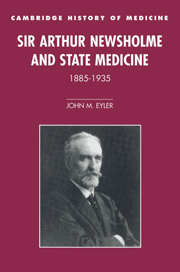Book contents
- Frontmatter
- Contents
- Illustrations
- Preface
- Abbreviations
- PART I THE MEDICAL OFFICER OF HEALTH AND THE LOCAL SANITARY AUTHORITY
- PART II NEWSHOLME AT THE LOCAL GOVERNMENT BOARD
- 7 Poverty, fitness, and the Poor Law
- 8 The Local Government Board and the nation's health policy
- 9 Launching a national tuberculosis program
- 10 The Great War and the public health enterprise
- 11 Infant and maternal mortality, interdepartmental conflict, and Newsholme supplanted
- PART III THE OLD WORLD AND THE NEW: NEWSHOLME AS ELDER STATESMAN
- Select bibliography
- Index
- Titles in the series
10 - The Great War and the public health enterprise
Published online by Cambridge University Press: 04 December 2009
- Frontmatter
- Contents
- Illustrations
- Preface
- Abbreviations
- PART I THE MEDICAL OFFICER OF HEALTH AND THE LOCAL SANITARY AUTHORITY
- PART II NEWSHOLME AT THE LOCAL GOVERNMENT BOARD
- 7 Poverty, fitness, and the Poor Law
- 8 The Local Government Board and the nation's health policy
- 9 Launching a national tuberculosis program
- 10 The Great War and the public health enterprise
- 11 Infant and maternal mortality, interdepartmental conflict, and Newsholme supplanted
- PART III THE OLD WORLD AND THE NEW: NEWSHOLME AS ELDER STATESMAN
- Select bibliography
- Index
- Titles in the series
Summary
CONTRACTION: PUBLIC HEALTH ON THE HOME FRONT
Almost five of Newsholme's eleven years at the Local Government Board were occupied by the demands of the First World War. He recalled two decades later that these demands had produced contradictory effects on the Boards activities. They “impeded much valuable work” and “stifled some progressive schemes at their birth,” but they also prompted some important initiatives. We begin by looking at the way in which the war tested the public health service and made the continuance of even routine activities extremely difficult and most innovation impossible. We will then turn to two areas in which the war prompted bold initiatives and major expansions of public health services: the prevention of venereal disease and the promotion of infant welfare.
“In Britain the time-honoured association between war and disease was broken during the Great War.” J. M. Winter reminds us of the great loss of human life to infectious disease during the war in Central and Eastern Europe and suggests that in Britain the “vagaries of disease,” improvements of nutrition, and a system of recruiting of medical practitioners that preserved a skeleton of general practitioner services at home may have been responsible for a happier fate. It may be impossible to determine in retrospect why anticipated events, a series of epidemics for example, did not occur, but it is historically useful to observe whether contemporaries foresaw danger and what they did to try to forestall it. In Britain the wartime public health service was mobilized early to use all available means to prevent the spread of infectious disease.
- Type
- Chapter
- Information
- Sir Arthur Newsholme and State Medicine, 1885–1935 , pp. 265 - 294Publisher: Cambridge University PressPrint publication year: 1997



